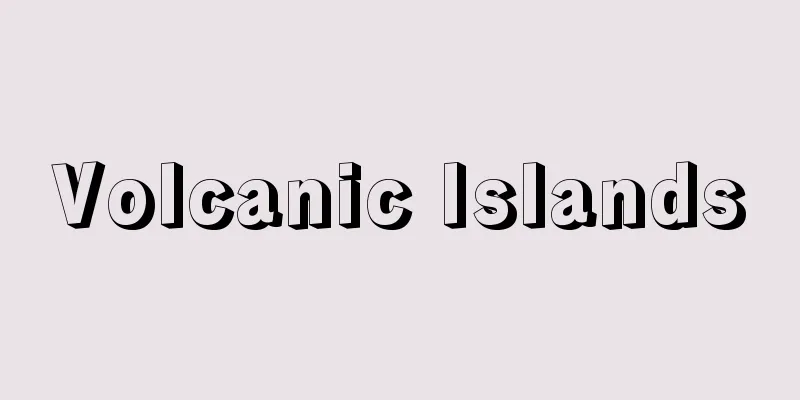Volcanic Islands

|
Located in the ocean south-southwest of the Ogasawara Islands, it consists of three volcanic islands: Kita-ioto (792 meters high at its highest point, 5.57 square kilometers in area), Iwo-to (169 meters, 23.16 square kilometers), and Minami-ioto (916 meters, 3.54 square kilometers). It belongs to Ogasawara Village, Ogasawara Branch Office, Tokyo. It is also called the Iwo Islands. It belongs to the East Japan Volcanic Belt, and while Iwo-to has flat land, the rest of the islands are sharp cone-shaped with well-developed sea cliffs. Eruptions frequently occur on the seabed within Iwo-to and near the other two islands, and new islands also appear near Minami-io-to. These three islands were discovered by Westerners, including Spanish warships, after 1543 (Tenbun 12), but were uninhabited and unowned for a long time. An exploration was carried out by the Governor of Tokyo Prefecture in 1887 (Meiji 20), and from around 1889 Japanese people began fishing and collecting sulfur, and in 1891 the island came under the jurisdiction of the Ogasawara Islands Office. Sugarcane and coca were also cultivated, and in 1944 (Showa 19) the population reached 1,254, but they retreated to the mainland during World War II. In February and March 1945, the Japanese army was annihilated in the battle for Iwo Jima, and the island was occupied by American forces, but was returned to Japan along with the Ogasawara Islands in 1968 (Showa 43). Currently, Iwo Jima is mainly staffed by personnel of the Maritime and Air Self-Defense Forces, but the other two islands are uninhabited. [Akira Suwa] [References] | | Islands | | MinamiSource: Shogakukan Encyclopedia Nipponica About Encyclopedia Nipponica Information | Legend |
|
小笠原諸島(おがさわらしょとう)の南南西方洋上にあり、北硫黄島(きたいおうとう)(最高点792メートル、面積5.57平方キロメートル)、硫黄島(169メートル、23.16平方キロメートル)、南硫黄島(916メートル、3.54平方キロメートル)の3火山島からなる。東京都小笠原支庁小笠原村に属する。硫黄列島ともいう。東日本火山帯に属し、硫黄島には平坦(へいたん)地があるが、ほかは鋭い円錐(えんすい)形で、海食崖(がい)が発達。硫黄島内や、他の2島付近の海底ではしばしば噴火し、南硫黄島付近では新島も出没する。この3島は1543年(天文12)以降、スペイン軍艦など、欧米人によって認められたが、長く無住、無主だった。1887年(明治20)東京府知事による探査が行われ、1889年ごろから日本人が漁業や硫黄採取を始め、1891年に小笠原島庁所管となった。サトウキビやコカの栽培も行われ、1944年(昭和19)には人口1254を数えたが、第二次世界大戦で内地へ引き揚げた。1945年2~3月、硫黄島の攻防戦で日本軍は全滅し、アメリカ軍が占領したが、1968年(昭和43)に小笠原諸島とともに返還された。現在、硫黄島には、おもに海上・航空自衛隊員が駐在しているが、他の2島は無人島である。 [諏訪 彰] [参照項目] | | | |出典 小学館 日本大百科全書(ニッポニカ)日本大百科全書(ニッポニカ)について 情報 | 凡例 |
<<: Volcanologist - kazanronsha
>>: Volcanic chain - Kazanletz
Recommend
Sakura Maruyama
Year of death: August 18, 1899 (Meiji 32) Year of ...
Concealing color
A color or marking of an animal that is confusingl...
Câmara Cascudo, L.da (English notation)CamaraCascudoLda
…During World War II, it was an important base fo...
《Kissaben》 - Kissaben
…Kashin brought about a breakthrough in the world...
Gonoura [town] - Gonoura
An old town in the southwest of Iki Island, Iki Di...
Caspian Sea - Kaspiyskoe More
The world's largest lake (salt lake), stretch...
Yang Shen
A Chinese man of letters in the mid-Ming dynasty....
Probabilistic Search
…Genetic Algorithms (GA) are algorithms inspired ...
Fishing rights exercise rules - Gyogyōkenkōshisoku
…Under the fishing system, the pearl culture and ...
El Niño - El Niño (English spelling)
A marine phenomenon that occurs once every few ye...
educational measurement
…In addition, educational evaluation is generally...
Morimotoa phreatica (English name) Morimotoaphreatica
...Many species live in stagnant water such as po...
Four examinations
〘Noun〙 A diagnostic method in Chinese medicine. It...
Itogusa type - Itogusagata
…There are several types of life cycles known for...
Gaieochos - Raises the world
…His children included Triton, the half-man, half...









